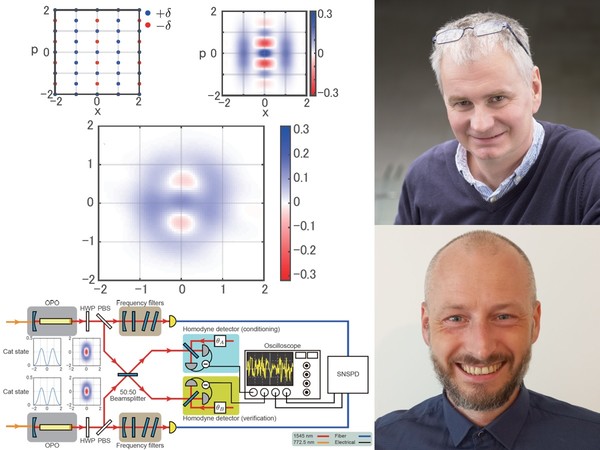An international team of scientists has experimentally created the world’s first Gottesman-Kitaev-Preskill (GKP) quantum codes propagating light, opening up the possibility of constructing optical quantum computers which offer exponential speed-up over classical computer technology. The unique experiment is a culmination of long-term collaboration between the scientists from the University of Tokyo, Palacký University Olomouc, and the University of Mainz. The results were published in Science.
Quantum computers offer a new way to process information thanks to the principle of quantum superposition. Their qubits – the quantum counterpart to classical bits – can contain not only values of 0 or 1, but also 0 and 1 concurrently. However, this makes these qubits highly vulnerable even to small random errors, therefore it is necessary to detect and correct even minute errors.
To make the qubits fault-tolerant, one logical qubit is usually encoded into a high number of physical qubits. This approach, however, makes it difficult to create larger quantum circuits, because it is necessary to maintain their overall quantum superposition. In the current research, the international team of researchers focused on encoding the logical qubits into optical oscillators, which can handle even quite complicated quantum codes and at the same time maintain their resistance to error. “These codes can be created, for example, with help of microwave quantum circuits in superconducting resonators, in the motion of individual cold atoms, and now, thanks to our result, at room temperature as engineered states of light, which is suitable for practical use,” explained Prof Radim Filip of the UP FS Department of Optics.
Pulses of propagating light working as an optical oscillator have the advantage that they do not need cooling. The optical code is composed of a high number of photons, but they are all coherently contained within the individual pulses. “These pulses can be combined, processed, and measured at room temperatures and at high speeds with the techniques of modern optical communications. Another key technology for such systems, nonlinear measurement, was already tested by the collaborative effort of the two teams in 2023 and the result was published in Nature Communication,” added Assoc Prof Petr Marek, UP FS Department of Optics.
The fault-tolerant GKP code in a single optical pulse is formed by high number of photons arranged in a very specific arrangement that can be represented by a virtual grid. “Random errors lead to deformations or shifts in the grid, which can be detected and corrected. Confirming whether the experimentally prepared state possesses these required properties was our task,” said Marek.
Constructing these GKP codes in optical systems is a very difficult task that requires strong nonlinearity, which is still an open challenge. “In the current experiment, such nonlinearity was provided by high-end photon number detectors. Looking to the future, we believe there will be further rapid scientific progress. Nonlinearity is the key to optical quantum computers,” added Prof Filip.
This long-term joint research of the teams from Olomouc and Tokyo was funded by a number of projects of the Grant Agency of Czech Republic, including an EXPRO project; and by the projects CLUSTEC and NONGAUSS within the frameworks of the Flagship and Widening programmes financed by Horizon Europe.
